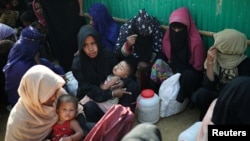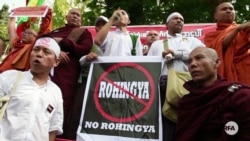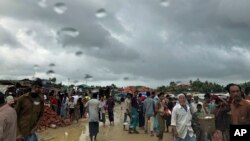Rohingya Muslims who fled a brutal military campaign in Myanmar last year are living in fear after being told they are on a list of over 2,200 people due to be forcibly returned to the country this month.
Some have said they are considering taking their own lives to avoid being sent back to Rakhine state, where Myanmar’s military is accused of waging a genocidal campaign of mass murder and rape.
“If we go back, they can kill us, they can torture us. We have already lost everything once,” said one man from the Jamtoli camp, speaking on the condition of anonymity, who was told by camp officials he is on the list along with his family.
Bangladesh and Myanmar last month struck a deal to begin returning Rohingya refugees by “mid-November”. The 2,200 names were picked from a list of 8,000 that Bangladesh gave to Myanmar in February.
Bangladesh’s refugee relief and rehabilitation commissioner, Abul Kalam, has told Human Rights Watch the Rohingya on the list “were not chosen because they particularly wanted to go back.”
More than 730,000 Rohingya have fled into Bangladesh since August last year from what UN investigators say is genocide. Myanmar has consistently denied the charge and says the campaign was a legitimate response to what it called terrorist attacks.
WATCH: Who Are The Rohingya?
The UN’s Special Rapporteur on human rights for Myanmar, Yanghee Lee,has called on both countries to scrap the plan to return people this month, warning Rohingya face a “high risk of persecution” if returned.
The plan may also “violate obligations under customary international law to uphold the principle of non-refoulement,” she added.
“Bangladesh should not be sending anyone at this time,” Nay San Lwin, a Rohingya activist, told VOA. “Forcing survivors and refugees back to the killing fields where genocide is still going on is complicity in genocide.”
A humanitarian who works closely with the Rohingya community in Bangladesh said that, although Rohingya at Jamtoli had been told they are on the list, names had not yet been officially confirmed. Until the UN's refugee agency receives an official list from the Bangladeshi government, "we're not entirely sure," who is due to be returned, they said.
They added that they were aware of one man who had attempted suicide after hearing he was on the list: "The issue is that the lack of clarity and communication alone is already causing harm regardless of whether repatriation actually starts."
Rohingya who believe they are on the list told VOA that a block leader in their camp said they would be moved to another location inside Bangladesh on November 12 in preparation for their return.
Myanmar has this year built “reception centers” and “transit camps” to house and process the expected returnees.
The facilities are surrounded by barbed wire and security posts, and advocates fear the camps could become permanent homes for returning Rohingya. “They are like concentration camps,” said Nay San Lwin.
Myanmar government spokesperson Zaw Htay told VOA he could not comment for this story.
The Rohingya man from the Jamtoli camp in Bangladesh, who was told his family was on the list last week, said his mother recently fainted from the stress.
As he was fleeing Rakhine state in September last year he saw his nephew and son-in-law shot dead, he said.
“Other families who are being sent back are crying loudly, all day and night,” he told VOA. “One family on the list have lost their parents. They’re crying, they have no one to look after them.”
Another man who was informed he was on the list told VOA he witnessed troops killing people from his village as he fled Rakhine state at the end of August last year. “They were killing everyone, small children, the elderly, everyone,” he said.
Earlier this week two block leaders - Rohingya volunteers who help refugees communicate with officials - approached him with a form and asked how many family members he has, and for a picture of the head of the family.
He refused, he said, and an argument ensued. “We will never agree to go,” he told them. “If they make us go we will take our own lives here, this is our final decision.”







